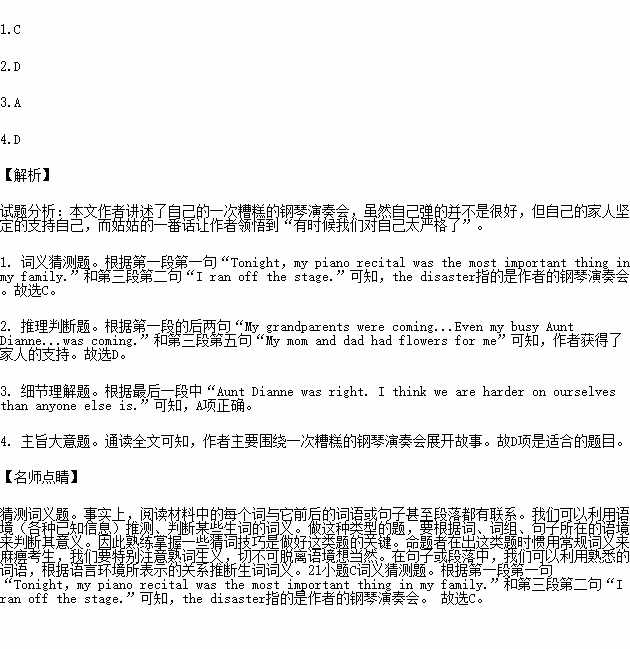题目内容
阅读下列短文,从每题所给的四个选项(A、B、C、和D)中,选出最佳选项。
Tonight, my piano concert was the most important thing in my family. My grandparents were coming by plane to hear me play. Even my busy Aunt Dianne who is on TV every night reading the news, was coming.
But one thing was for sure. I would never win an award for my piano playing. And that's just because the more I practiced ,the more nervous I got. So there I was, on stage, in my beautiful dress, and I sat down at the piano. But when I started to play, I hit a wrong note. I told myself to start over. But then I hit the wrong note again. It was as if I hadn't practiced at all.
Finally the disaster was over. I ran off the stage. I couldn't understand why people were applauding. But they were. My mom and my dad had flowers for me, and we were all supposed to go out for a nice dinner, but I couldn't. I just wanted to go home and cry and never go anywhere again. After we went back home, Aunt Dianne just came in and sat down on the side of my bed.
"It was my first night on the air," she said."I had never been on television before, and I made a mistake. I mispronounced my name and the name of the news show. And you know what? No one even noticed but me. Just like tonight, no one noticed—just you". Aunt Dianne was right. I think we are harder on ourselves than anyone else is. Maybe I will leave my room. And maybe, I'll play the piano again.
1.The underlined part "the disaster" in paragraph 3 refers to ________.
A.the loud cheer of the audience
B.the laughs from the audience
C.the author's piano performance
D.the author's long dress
2.We can infer from the text that ________.
A.music played a big role in the author's life
B.the author enjoyed staying with her family
C.piano practice made the author fell confident
D.the author got support from her family
3.What did the author learn from her piano performance?
A.Don't be too hard on yourself.
B.Things seldom go as well as people expect.
C.No one will care what others have done.
D.Never think much of a matter.
4.What would be the best title for the text?
A My piano lesson B. My family and I
C. My aunt Dianne D. A piano concert disaster


